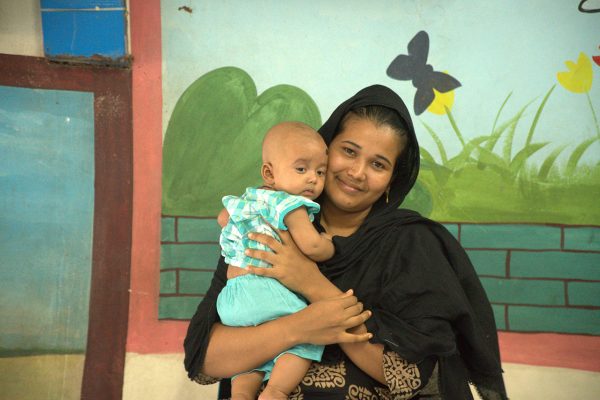COVID-19: Update from Asif Saleh (2 May 2020)
Reading Time: 3 minutes
One of Bangladesh’s biggest harvests is almost complete, RMG factories are continuing to open, three private hospitals have been given approval to do COVID-19 testing and we have constructed a Khichuri Index to gauge food inflation as a result of the economic shutdown.
Read the latest on the situation in Bangladesh and BRAC’s response.
Dear colleagues, partners and friends,
First some good news. We previously mentioned the forecast of potential flash floods in haor regions (low-lying wetlands), which produce 20% of the total rice production of the country. That forecast has not materialised thankfully.
75% of the harvest of boro rice, a special kind of rice cultivated on residual waters in low-lying lands, is complete in Sunamganj, northwestern Bangladesh. The rest of the harvest is expected to be completed within the next week. It has been a race against time for farmers in the haor regions to complete the harvest before the forecasted flash floods. 20% of the country’s supply of rice is grown in these regions. People from all walks of life, including volunteers from local communities and administration, stepped up to offer their support in the harvesting.
Concerns remain in the agricultural sector however, as farmers are forced to sell their produce at lower prices to rice mill owners and hoarders in the Sylhet division, due to delays in government procurement. The government announced that it will buy 800,000 tonnes of paddy from farmers across Bangladesh for BDT 26 (USD 2.3) per kilogram this season.
As the economy is heading for a massive storm, we thought it would be important to start tracking food inflation going forward. We have constructed the Khichuri Index to understand the net impact of these changes on the food security of people who depend on daily wages. The Khichuri Index reflects the weighted average cost of a bowl of khichuri— a popular all-day meal in most Bangladeshi homes. This index is similar to the Financial Times’ ‘Breakfast Index’, which is constructed using the weighted average of the cost of a continental breakfast. In Bangladesh, the idea was floated by Jyoti Rahman.
Countries that employ millions of Bangladeshi migrant workers are pressing to repatriate Bangladesh nationals deemed undocumented or in prison/detention in foreign countries, warning of blacklisting origin countries which do not comply. Civil society organisations in Bangladesh have urged UN Secretary-General Antonio Guterres to appeal to these countries to refrain from policies to force repatriation of migrants. At least 247 Bangladeshi workers were sent back to Bangladesh from Kuwait in the last week. Special flights have been arranged to bring back Bangladeshis from Japan and South Korea within this week. BRAC has handed over a 430-room learning centre located opposite to Hazrat Shahjalal International Airport to the government to use as a quarantine facility for returnee migrants.
It is high time to collaborate to ensure that workers in the RMG sector are safe, as more than 2,000 RMG factories reopened on Tuesday (27 April). The International Labour Organisation has warned that without adequate safeguards for returning workers there could be a second wave of the virus, urging governments, including Bangladesh, to adopt protective measures. Thousands of workers took crowded public transport to return to industrial zones, even after the home minister stated that no one would be permitted to enter Dhaka to work. Bangladesh Garment Manufacturers and Exporters Association stated that they have conducted surprise inspections of 27 factories, where they found 25 to be in satisfactory condition and that it will be done daily in all industrial zones. However, media reports suggest flouting of safety standards and factories opening simultaneously in places where a staggered opening was promised.
It is encouraging to observe that the government has allowed three private hospitals to conduct COVID-19 diagnosis tests on a limited scale. The Bangladesh Public Service Commission has also finalised its recommendation to recruit 2,000 doctors and 5,000 nurses. More than 300 doctors have been infected with the virus, with several doctors in quarantine. The government hopes that these recruitments of new doctors and nurses will help to fight the crisis.
BRAC has partnered with PepsiCo in Bangladesh, along with the global food and beverage company’s philanthropic arm, the PepsiCo Foundation, to provide over 1.4 million meals to families in vulnerable situations. This initiative is part of PepsiCo’s #GiveMealsGiveHope global programme.
Thank you to the BRAC family for contributing BDT 39,922,870 (USD 471,007) – one day’s salary – to BRAC’s appeal, as well as popular Bangladeshi actor and singer Tahsan, who auctioned the master copy of his album and lyrics to donate BDT 750,000 (USD 8,832).
See the full report here. If you want to see any particular issue covered, please let us know at covid19response@brac.net.





